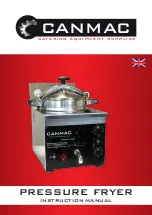
left and right-hand side. Connect the hose to
whichever is the more convenient by pulling the
ring nut (A) from the vent outlet at the back,
screwing it on to the hose and pushing it firmly
back into place. The unused vents should now
be sealed with the special snap covers provi-
ded.
A
A
If the hose is long and
the room temperature
low, the moisture might
condense to water
inside the hose. This is
an unavoidable natural
phenomenon. To
prevent this water from
Iying in the hose or
flowing back into the tumble dryer, it is
advisable to drill a small hole (via. 3 mm) in the
lowest point of the hose and to place a small
container below it. (See picture, point B).
Once connected to the dryer, run the vent hose
to the desired outlet point, ensuring that the
run’s overall length is less than 2 m, and that it
contains no more than two bends. As to the
outlet itself, if you have decided on a fixed wall/
window grille, a good local builder’s merchant
should be able to supply you with the necessary
fittings and installation advice.
Warning!
It is important not to
connect the vent hose
to, for example, a
cooker hood, or a
chimney or flue pipe
designed to carry the
exhaust from a fuel
burning appliance.
B
Note that to avoid condensation problems, it is
essential that the dryer be fitted with the flexible
hose to carry its “exhaust” at least beyond the
kitchen units; preferable outside the kitchen. In
order to prevent the appliance from overheating,
it is important that the steam exhaust is unob-
structed. Therefore, in case of a permanent
hose fitted to an exterior wall or ceiling, it must
be ensured an exhaust capacity of at least 150
m3/h. If the dryer is fitted next to kitchen units,
make sure that the vent hose is not squashed. If
the hose is partially squashed, drying efficiency
will be reduced, resulting in longer drying times
and higher energy consumption. If the hose is
completely squashed, the safety cut-outs with
which the machine is fitted may operate. When
operating the tumble dryer, the room tempera-
ture must not be lower than +5°C and higher
than +35°C, as it may affect the performance of
the appliance.
Electrical connection
Details on mains voltage, type of current and the
fuses required should be taken from the rating
plate. The rating plate is fitted near the loading
aperture (see “Product description” chapter).
Connect the machine to an earthed socket, in
accordance with current wiring regulations.
Warning!
The manufacturer declines
any responsibility for damage or
injury through failure to comply with the
above safety precautions.
Should the appliance power supply cable
need to be replaced, this must be carried
out by an authorised service engineer or a
qualified electrician. .
The appliance is supplied with a 13 amp plug
fitted. In the event of having to change the fuse
in the plug supplied, a 13 amp ASTA approved
BS 1363/A fuse must be used.
13
www.zanussi.com


































